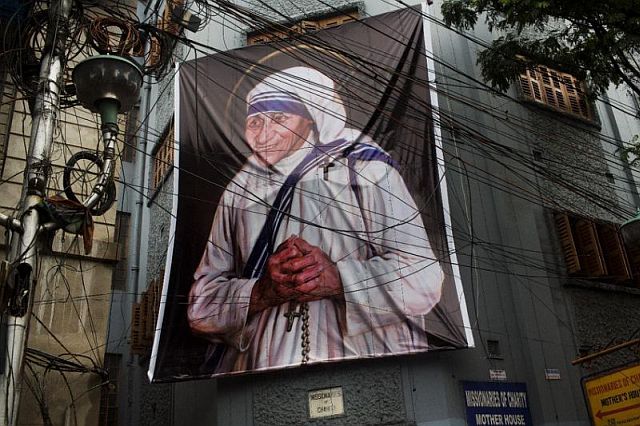
A giant picture of Mother Teresa is displayed outside the Missionaries of Charity Mother house in Kolkata, India, Saturday. (AP)
VATICAN CITY — Thousands of pilgrims thronged to St. Peter’s Square on Sunday for the canonization of Mother Teresa, the tiny nun who cared for the world’s most unwanted and became the icon of a Catholic Church that goes to the peripheries to tend to lost, wounded souls.
Pope Francis declared Mother Teresa a saint at a morning Mass, making her the model of his Jubilee Year of Mercy and in some ways, his entire papacy. For Pope Francis, Mother Teresa put into action his ideal for the church to be a merciful “field hospital” for the poorest of the poor, those suffering both material and spiritual poverty.
Throughout the night, pilgrims prayed at vigils in area churches and flocked before dawn to the Vatican under heavy security to try to get a good spot for the Mass that was expected to draw more than 100,000 people.
“I think most of all we are thankful to her (Mother Teresa) for the message, for really changing our lives with her example, humility, being close to the poorest of the poor,” said Simone Massara as he prayed with his wife at a vigil at the Basilica of Sant’Andrea della Valle before the mass.
While Pope Francis is clearly keen in holding Mother Teresa up as a model for her joyful dedication to the poor, he is also recognizing holiness in a nun who lived most of her adult life in spiritual agony sensing that God had abandoned her.
According to correspondence that came to light after she died in 1997, Mother Teresa experienced what the church calls a “dark night of the soul” — a period of spiritual doubt, despair and loneliness that many of the great mystics experienced. In Mother Teresa’s case, it lasted for nearly 50 years — an almost unheard of trial.
For the Rev. Brian Kolodiejchuk, the Canadian priest who spearheaded Mother Teresa’s saint-making campaign, the revelations were further confirmation of Mother Teresa’s heroic saintliness.
Disclaimer: The comments uploaded on this site do not necessarily represent or reflect the views of management and owner of Cebudailynews. We reserve the right to exclude comments that we deem to be inconsistent with our editorial standards.
